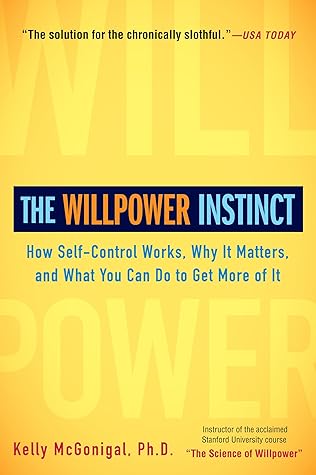More on this book
Community
Kindle Notes & Highlights
Read between
February 22 - March 8, 2020
As Deb Lemire, president of the Association for Size Diversity and Health, says, “If shame worked, there’d be no fat people.”
Studies show that the more racial minorities are exposed to prejudice, the less self-control they have—and just reminding minorities of discrimination depletes their willpower.
Anytime we feel excluded or disrespected, we are at greater risk for giving in to our worst impulses.
the Romeo and Juliet effect—the well-known psychological tendency to fall deeper in desire whenever a romance is forbidden.
We estimate how likely or true something is by the ease with which we can bring it to mind.
The willingness to think what you think and feel what you feel—without necessarily believing that it is true, and without feeling compelled to act on it—is an effective strategy for treating anxiety, depression, food cravings, and addiction.
As we consider the evidence for each, we’ll see that giving up control of our inner experiences gives us greater control over our outer actions.
Goldin studies what happens in anxiety sufferers’ brains when they worry. He has found that people with social anxiety are worse at controlling their thoughts than the average person, and it shows in their brains.
He teaches social anxiety sufferers to observe and accept their thoughts and feelings—even the scary ones. The goal is not to get rid of the anxiety and self-doubt, but to develop a trust that they can handle these difficult thoughts and feelings. If they learn that there is no inner experience that they need to protect themselves from, they can find more freedom in the outer world.
dieters who suppress thoughts about food have the least control around food.
science is now confirming that restricting a food automatically increases your cravings for it.
What are we to do with our thoughts and cravings if not push them away? Maybe we should embrace them.
ACCEPT THOSE CRAVINGS—JUST DON’T ACT ON THEM
THE NO-DIETING DIET
You can get the focus off of prohibiting your bad habit by replacing it with a new (hopefully, healthier) habit.
commit to spending this week focusing on positive action rather than prohibition.
urges always pass eventually, whether or not you give in to them.
When they felt a strong craving, they should imagine the urge as a wave in the ocean. It would build in intensity, but ultimately crash and dissolve.
This is one of the best side effects of surfing the urge: You learn how to accept and handle all your difficult inner experiences, and no longer need to turn to unhealthy rewards for comfort.
When the urge takes hold, pause for a moment to sense your body. What does the urge feel like?
these three skills—self-awareness, self-care, and remembering what matters most—are the foundation for self-control.
Feel what you feel, but don’t believe everything you think.
Surf the urge. When an urge takes hold, stay with the physical sensations and ride them like a wave, neither pushing them away nor acting on them.
People who have the greatest self-control aren’t waging self-war. They have learned to accept and integrate these competing selves.
If there is a secret for greater self-control, the science points to one thing: the power of paying attention.


